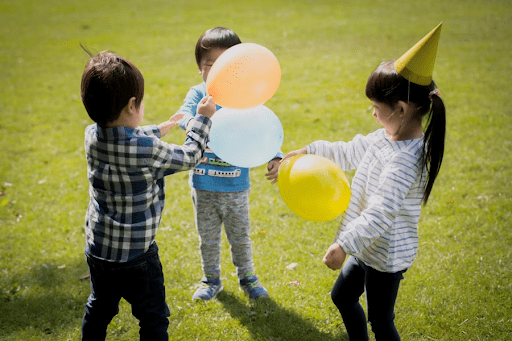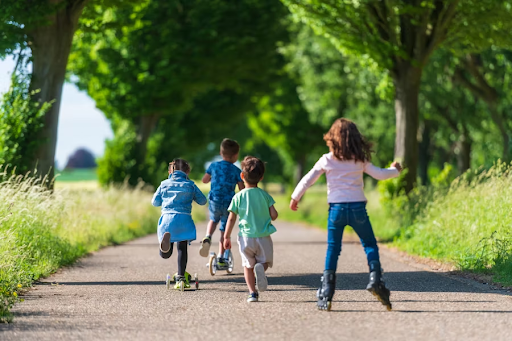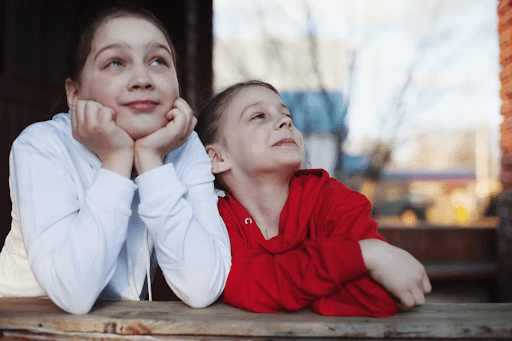
Childhood memories are significantly shaped by the experiences of play and care. How do these elements contribute to memorable and lasting childhood experiences? This article explores how childhood memories are shaped through play and care, highlighting their crucial roles in emotional and cognitive development. Parents can expect practical insights into fostering an environment that helps children build positive, enduring memories.
The Role of Play in Childhood Development
Play is not just a way for children to pass time; it is essential for early childhood development. Through play, children explore, solve problems, and interact, which supports brain development and builds crucial social, cognitive, and physical skills. Whether through imaginative games, physical activities, or creative tasks, play fosters overall growth.
Outdoor play promotes physical health and cognitive abilities. Activities like riding bikes improve coordination, balance, and motor skills while being fun and engaging. Pedal cars and ride-on toys such as Berg Bikes give children opportunities to strengthen independence and confidence while creating joyful memories. Physical play also boosts blood flow to the brain, enhancing concentration and cognitive function.
Imaginative play, such as pretend games, encourages complex thinking and helps children understand their world, building confidence to explore and learn. Socially, play teaches cooperation, rule-following, and turn-taking. Regular physical and imaginative play improves mood, reduces stress, and strengthens problem-solving and creativity, laying a strong foundation for future learning and development.
Structured Support and Early Guidance
Structured support and early guidance are essential to ensure children receive timely interventions during critical developmental stages. Early childhood intervention services identify and address developmental challenges, providing personalized plans tailored to each child’s unique needs. These plans require ongoing evaluation and collaboration among families, practitioners, and the community to ensure a holistic approach to growth.
Personalized intervention plans, based on comprehensive assessments, adapt as the child develops. National guidelines emphasize a family-centered approach, recognizing each child’s individuality and the importance of collaboration among families, educators, and professionals. Such coordinated efforts enhance the effectiveness of support, helping children meet developmental milestones and thrive emotionally and socially.
Effective early intervention promotes social and communication skills, laying a strong foundation for future success. Structured support and guidance ensure children not only reach milestones but also flourish in their overall development.
Capturing Memories Through Photography
Photographs are more than just snapshots; they capture the essence of our early memories and preserve them for a lifetime. Documenting childhood experiences through photography holds great emotional value, creating a visual story of a child’s growth and milestones. Involving children in this process makes these moments more meaningful, allowing them to express their feelings and recall experiences authentically.
Exploring old photo albums brings joy as families relive cherished moments. A Melbourne newborn photographer can help parents preserve those fleeting early milestones, from first smiles to birthdays, creating treasured keepsakes. These photos highlight both significant events and everyday life, shaping a child’s identity.
Photographs help children build a strong sense of self and family identity. They serve as tangible reminders of love and care, reinforcing positive experiences and leaving a lasting impact on their episodic memory and emotional well-being.
Whether a candid shot of siblings playing or a family portrait, these images become part of the family’s shared history, strengthening bonds and preserving memories.
Building Bonds Through Daily Interactions
In everyday life, small moments often hold great value. Daily interactions, rituals, and shared activities play a vital role in building strong family bonds and lasting memories. Simple events like family dinners, bedtime stories, or walks in the park can be as meaningful as major life events, highlighting the importance of everyday life.
Ways to engage children in family life include:
- Involving them in daily routines like dinnertime or bedtime to reinforce belonging and family identity.
- Creating a family adventure journal to share experiences and preserve memories.
- Celebrating individual differences to foster inclusivity and enrich learning.
Positive caregiver-child interactions are essential for emotional health and a secure environment. These moments build trust and love, supporting a child’s growth and development. Emphasizing quality daily interactions nurtures emotional well-being and strengthens family bonds.
Emotional Intelligence and Social Skills Through Care
Early play and attentive care are key to developing a child’s emotional intelligence and social skills. Activities like role-play and storytelling help children:
- Understand emotions
- Develop empathy
- Practice cooperation and decision-making
These experiences foster emotional response, intelligence, and resilience in youth.
Trusting relationships with caregivers encourage self-expression and problem-solving. Caregivers who show warmth and respect help children form secure attachments and improve social skills. Open dialogue and validating feelings strengthen these bonds, making children feel valued and heard. Such positive interactions are vital for social and emotional growth, helping children build strong relationships and navigate social situations.
Early interventions can address developmental challenges effectively, promoting better outcomes. A nurturing environment that emphasizes emotional intelligence equips children with skills to manage emotions and build healthy relationships, influencing their career choices and personal lives throughout their future.
Importance of Routine and Consistency
Establishing predictable daily routines is extremely important for a child’s sense of security and emotional development. Regular routines support emotional and social growth by fostering self-regulation skills needed to manage feelings and behaviors. Predictable environments help children cope with stress and adapt to new situations.
A structured daily routine lets children know what to expect, reducing anxiety and promoting stability. This consistency builds trust between children and caregivers, providing a secure foundation for growth. At the same time, flexibility within routines allows parents to adapt to children’s needs during uncertain times, ensuring they feel supported even when changes occur.
Balancing consistency with adaptability creates a nurturing environment that promotes emotional well-being and resilience in children.
Encouraging Exploration and Curiosity
Encouraging exploration and curiosity in early childhood is key to fostering a lifelong love of learning. Effective strategies include:
- Creating stimulating environments
- Providing easy access to learning materials for children to explore
- Incorporating music, movement, and sensory play to boost creativity and coordination
These approaches help children understand the natural world and science through their learning journey.
Flexible daily schedules let children pursue interests without feeling rushed, promoting joy and wonder. Asking open-ended questions and simple experiments fosters critical thinking and deepens curiosity. Educators and caregivers modeling curiosity inspire children to embrace exploration as part of daily life.
Interactive activities like puzzles and role-play enhance problem-solving, literacy, and numeracy skills. Supporting exploration and curiosity nurtures a love for learning that shapes children’s interests and future paths.
The Impact of Positive Reinforcement
Positive reinforcement is a powerful tool in childhood development, encouraging desired behaviors by offering rewards such as social approval, material rewards, or participation in enjoyable activities. Being specific and immediate helps children connect their actions with positive outcomes.
Using a mix of reinforcement types—like verbal praise, tangible rewards, or a ‘Caught Being Good’ jar—maintains motivation and encourages positive behavior. Celebrating children’s exploration and achievements boosts confidence, self-esteem, and fosters a positive self-image.
Consistent positive reinforcement creates a nurturing environment that supports emotional and social growth, strengthens bonds between children and caregivers, and promotes a loving family dynamic.
The Influence of Family Dynamics
Family dynamics significantly shape childhood experiences and future relationships. Parental interactions influence children’s ability to form healthy adult relationships. Nurturing families often foster secure attachment styles, while parental conflict can cause fear and affect emotional responses later in life.
Consistent emotional support builds resilience against stress, helping children handle challenges better. Harsh parenting may lead to emotional regulation and relationship difficulties. Siblings also contribute to developing interpersonal skills and conflict resolution.
Creating shared family memories strengthens bonds and cultivates a supportive environment that nurtures emotional and social skills essential for a fulfilling life.
The Long-Term Benefits of Play and Care
The benefits of play and care extend beyond early childhood, influencing cognitive, social, and emotional development throughout life. Outdoor play stimulates the senses and encourages creative problem-solving, supporting skills essential for personal and professional success.
Physical play improves motor skills, which aid cognitive and social growth. Social and emotional health is critical for overall development and academic performance, making play and care key components of a well-rounded upbringing.
Prioritizing play and care helps children build resilience and skills needed for a fulfilling life. These early experiences lay the foundation for cognitive, social, and emotional well-being, shaping who children become as adults through childhood play.
Summary
In summary, the role of play, structured support, and documenting moments through photography are all crucial elements in shaping meaningful and lasting childhood memories. Play activities stimulate cognitive, social, and physical development, fostering creativity and problem-solving skills. Structured support and early guidance ensure that children receive the necessary interventions to thrive, while involving families in the process enhances the effectiveness of these strategies.
Documenting childhood experiences through photography captures the emotional value of these moments, creating a visual narrative that children and families can cherish for a lifetime. Daily interactions and rituals, along with positive reinforcement, build strong family bonds and promote emotional and social well-being. Encouraging exploration and curiosity fosters a love of learning, while routine and consistency provide a secure foundation for emotional development.
Parents and caregivers play a vital role in creating a nurturing environment that supports their children’s growth and development. By focusing on play, care, and early guidance, they can help shape positive childhood memories that will last a lifetime.

The Benefits of Dance for School-Aged Children: A Perfect School Holiday Activity










